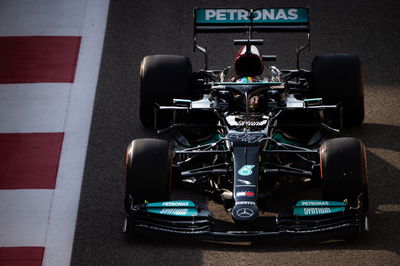Mercedes expects "relatively similar" performance to 2021 from 2022 F1 cars

F1 has introduced entirely new technical regulations for this season in a bid to level the playing field while aiding overtaking.
The changes for this year include a move from 13-inch to 18-inch tyres with wheel covers, simplified bodywork and front wings, and a ground effect floor, while the budget cap has been reduced to $140 million.
Due to the aforementioned changes resulting in an increase in weight, lap times were expected to be two to three seconds slower.
Speaking in a video on Mercedes’ YouTube channel, Elliott doesn’t think this will be the case.
“The overall performance of the new cars is probably not going to be very different from the old. Obviously, the intention of these regulations was to try and improve overtaking, and it’ll be a little bit of time before we can see whether that’s actually happened.
“The cars are a bit heavier, the power unit on E10 fuel is going to perform slightly differently. And the way the aerodynamics are going to work, and the set-up of the car that goes with it will be different as well.
“Until we get the best out of that, until we’ve developed that and through testing and through the first few races, we’re not really going to know.
“But overall, I suspect the performance will be relatively similar to last year.”
Elliott admitted that the new regulations have made for a more-complicated winter break.
“When you get a new set of regulations it’s a new challenge to start from scratch,” he added. “In most years when you have carry-over regulations you have a pretty good idea of what ‘good’ looks like. You know what sort of gains you need to make from the previous year’s car and you can sort of work on a direction of fine-tuning and finding all those incremental gains.
“When you’ve got a brand-new set of regulations you don’t know what the limit is, you don’t know where you can get to, and that’s exciting for engineers – to explore that and do it in a better way than the opposition.
“In a normal year you’ve got a pretty good idea of what you need to find over the winter, but with the brand new regulations who knows what’s going to turn up or what the competition will have brought.”

![Toprak Razgatlioglu, ROKiT BMW Motorrad, BMW M 1000 RR [Gold & Goose]](https://cdn.crash.net/2024-09/GnG_1165424_HiRes.jpg?height=90)






![Johann Zarco, LCR, Honda RC213V, 2024 San Marino MotoGP, Misano, action [Gold & Goose]](https://cdn.crash.net/2024-09/GnG_1166323_HiRes.jpg?height=90)

![Jack Miller, KTM Factory Racing, KTM RC16, San Marino MotoGP, Misano, action [Gold & Goose]](https://cdn.crash.net/2024-09/GnG_1167624_HiRes.jpg?height=90)